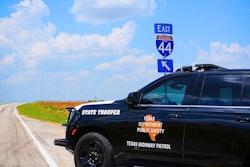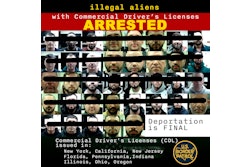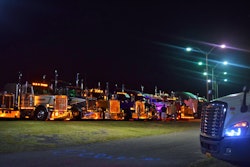DOT Secretary Sean Duffy on Thursday threatened to withhold $75 million in federal funding from Pennsylvania after finding the state violated federal safety regulations "by issuing non-domiciled commercial driver’s licenses (CDLs) illegally."
DOT invoked a recent "terrorist" CDL driver's arrest in finding Pennsylvania out of compliance with licensing regulations.
DOT took a similar line against California, which denied those charges at first before eventually complying somewhat.
Now Pennsylvania also disputes DOT's characterization of its licensing procedures, but nonetheless it's under strict orders to overhaul its CDL systems.
The move comes just days after a Department of Homeland Security release said it arrested 31-year-old Pennsylvania non-domiciled CDL holder Akhror Bozorov. Bozorov, DHS said, was "wanted in his origin country" of Uzbekistan "for belonging to a terrorist organization."
Bozorov's arrest "underscores the importance of the Secretary’s nationwide audit of non-domiciled CDLs, which commenced in June," a DOT release said.
Pennsylvania represents one of the country's leading issuers of CDLs to non-citizens in the country with temporary work authorization. A July report on all 50 states' non-domiciled CDL practices revealed Pennsylvania had issued more than 11,000 such CDLs that remained active.
A letter sent from USDOT to Pennsylvania's transportation department stated that an annual review of the CDL licensing program in the state "obtained evidence of procedural and programming errors in Pennsylvania's issuance of non-domiciled commercial learner's permits."

According to USDOT, "FMCSA found that PennDOT issued non-domiciled CDLs that extend beyond the expiration of drivers' lawful presence in the United States, issued non-domiciled CDLs without requiring the non-domiciled driver to comply with the standards for providing proof of lawful presence in the United States, and issued non-domiciled CDLs to lawful permanent residents who were eligible for a regular CDL."
DOT previously stated California had committed many of those same errors, most notably issuing CDLs valid long past an applicant's length of legal stay in the country. California denied those charges, saying that federal law does not require CDLs to expire when work authorization expires, but conceding that licenses issued that way violate the state's own laws.
Initially, California refused to revoke some 20,000 CDLs it issued in violation of state law, but later DOT would announce the state had in fact begun revoking 17,000 non-domiciled CDLs. DOT still might withhold some $160 million in highway funding from California pending further action with respect to non-domiciled CDLs that don't meet federal standards.
[Related: California explains why it upgraded Jashanpreet Singh's CDL days before fatal I-10 crash]
Now, DOT's communication to Pennsylvania makes clear it doesn't buy California's analysis that no federal law had been violated with the CDL terms exceeding the work authorizations. DOT said Pennsylvania violated "existing federal safety regulations by issuing non-domiciled" CDLs illegally.
FMCSA's review of Pennsylvania's licensing systems found the state issuing non-domiciled CLPs or CDLs in excess of the expiration date of the driver's lawful presence documents "due to typographical errors committed by PennDOT employees at the time of the transaction," the letter to Pennsylvania said.
Furthermore, FMCSA said that "for some transactions, the State cannot provide evidence that it required non-domiciled drivers to comply with the standards for providing proof of lawful presence because PennDOT's licensing system does not document the type of immigration credential(s) the [PennDOT] employee reviews at the time of the transaction."
FMCSA said it found two instances out of 150 reviewed where licenses remained valid longer than the applicant's legal work authorization.
PennDOT "reported that it took action, or intends to take action, to downgrade" those CDLs, the letter said, but "these repeated errors are evidence of the procedural deficiencies in PennDOT's non-domiciled CLP and CDL issuance practices."
For another four out of the 150 licenses reviews, FMCSA added, "PennDOT provided no evidence that it required non-domiciled drivers to comply with the standards for providing proof of lawful presence at the time of the transaction."
Finally, the letter stated PennDOT twice issued non-domiciled CDLs to legal permanent residents of the U.S., who should have been eligible for a regular CDL.
PennDOT must take the following actions or risk losing $75 million in federal funding:
- Immediately pause the issuance of all new, renewed, transferred, or upgraded nondomiciled CLPs and CDLs until FMCSA provides written confirmation that PennDOT's corrective action plan has been accepted and implemented;
- As soon as practicable, identify all unexpired non-domiciled CLPs and CDLs that were not issued in compliance with federal regulations;
- Conduct an internal audit to identify all procedural and programming errors; training and quality assurance problems; insufficient policies and practices; and other issues that have resulted in the issuance of non-domiciled CLPs and CDLs that did not meet federal standards;
- Review all supporting documentation for all new, renewed, transferred, or upgraded non-domiciled CLP and CDL transactions to ensure compliance with federal regs.
- Provide FMCSA a copy of the audit findings and the number of unexpired noncompliant non-domiciled CLPs and CDLs;
- Take immediate action to correct the deficiencies identified in PennDOT's internal audit;
- Take immediate action to void or rescind all unexpired noncompliant non-domiciled CLPs and CDLs and reissue the licenses in accordance with federal regs; and
- Resume issuing non-domiciled CLPs and CDLs only after the State has voided or rescinded all unexpired noncompliant non-domiciled CLPs and CDLs and reissued the licenses in accordance with federal regs.
Pennsylvania told Overdrive on Friday that it had already paused issuance of non-domiciled CDLs following DOT's September 29 emergency rulemaking changing the terms for eligibility and ordering such a pause.
That rulemaking, which explicitly sought to force nearly 200,000 non-domiciled CDL holders out of commercial driving work, got put on hold by a court last week, but PennDOT said it had yet to resume non-domiciled CDL issuance.
[Related: Non-domiciled CDLs back in action after court blocks FMCSA rule?]
Despite the setback in court, Duffy vowed to continue to fight the ruling and pursue his goal of purging non-domiciled drivers from the industry.
“Under President Trump, this Department is taking every measure to ensure dangerous foreign drivers aren’t illegally operating 40-ton vehicles on American roads,” said Duffy. “Joe Biden allowed tens of millions of illegals to pour into our country through open borders, including a suspected terrorist who Pennsylvania then allowed to get behind the wheel of a semitruck. I will continue to fight to get these dangerous drivers off our roads to protect American families and support our national security.”
Pennsylvania responds
"PennDOT fully cooperated with FMCSA's regularly-scheduled audit -- and out of 150 cases the federal government audited, FMSCA did not identify a single commercial driver's license issued to someone who was not eligible," a spokesperson for PennDOT told Overdrive.
"All non-citizens who apply for driver’s licenses, including CDLs, must provide PennDOT with proof of identity and must have their legal presence in this country verified through the federal Systematic Alien Verification for Entitlements (SAVE) database -- a database maintained by the United States Department of Homeland Security," the spokesperson continued.
FMCSA's own letter threatening to withhold funds acknowledges PennDOT used the SAVE database, even in the cases it found fault with. Here, PennDOT appears to be taking up the same defense that California and New York have -- stating the federally managed database approved the CDL applicant.
Additionally, PennDOT appears to side with California in finding no federal law dictates non-domiciled CDLs have to expire when work authorization does.
"PennDOT follows the established federal process for confirming that the applicant was lawfully present using the SAVE database in every case," the spokesperson said. "PennDOT's top priority is safety on our roadways and ensuring only those legally eligible are able to secure a license. The Department is reviewing FMCSA's letter and will respond within the required timeline."
FMCSA gave the state 30 days to respond.











